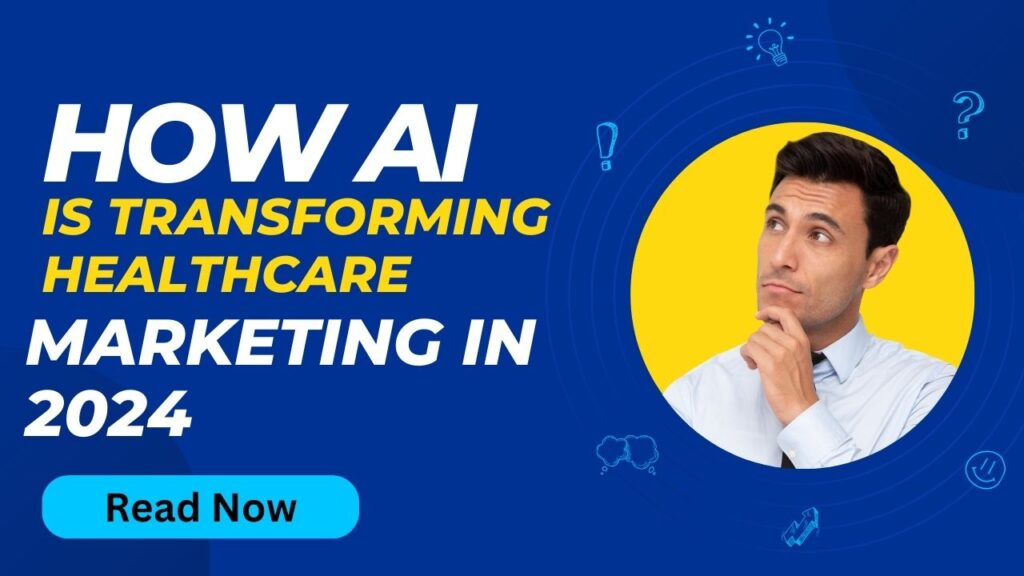In the dynamic world of healthcare marketing, the year 2024 marks a significant shift driven by the integration of artificial intelligence (AI). AI is not just a futuristic concept but a present-day reality that is reshaping how healthcare organizations connect with patients, streamline operations, and enhance overall marketing effectiveness. In this blog post, we’ll explore how AI is transforming healthcare marketing, making it more efficient, personalized, and impactful than ever before.
Table of Contents
The Current Landscape of Healthcare Marketing
Healthcare marketing has come a long way from traditional methods like print ads and billboards. Today, it’s all about digital engagement, but the industry faces unique challenges. Regulatory compliance, patient privacy concerns, and data management complexities are just a few of the hurdles healthcare marketers must navigate. Despite these challenges, the need to connect with patients on a deeper, more personalized level remains paramount.
The Rise of AI in Healthcare Marketing
The adoption of AI technologies is revolutionizing healthcare marketing. Machine learning, natural language processing, and predictive analytics are no longer just buzzwords but essential tools for modern marketers. In 2024, the adoption rates of AI-driven solutions are skyrocketing, reflecting a significant trend toward embracing these advanced technologies.
AI Technologies in Use
- Machine Learning (ML): ML algorithms analyze vast amounts of data to identify patterns and predict outcomes, helping marketers tailor their strategies to specific patient needs.
- Natural Language Processing (NLP): NLP allows for the analysis of patient feedback and interactions, enabling better understanding and more personalized communication.
- Predictive Analytics: By analyzing historical data, predictive analytics can forecast future trends, helping healthcare marketers stay ahead of the curve.
Adoption Statistics
Recent studies show that over 70% of healthcare organizations are now using some form of AI in their marketing efforts. This trend highlights the growing recognition of AI’s potential to drive more effective and efficient marketing strategies.
Key Benefits of AI in Healthcare Marketing
AI brings numerous benefits to healthcare marketing, transforming how organizations engage with patients and optimize their campaigns.
Enhanced Targeting and Personalization
One of the most significant advantages of AI is its ability to deliver highly targeted and personalized marketing campaigns. By analyzing patient data, AI can identify specific needs and preferences, allowing marketers to tailor their messages accordingly. This level of personalization not only improves patient engagement but also increases the likelihood of positive outcomes.
Improved Customer Engagement
AI-driven chatbots and virtual assistants are revolutionizing patient interaction. These tools provide immediate, personalized responses to patient inquiries, enhancing the overall customer experience. For example, chatbots can schedule appointments, answer common questions, and even provide medication reminders, making healthcare more accessible and convenient.
Data-Driven Insights
AI excels at gathering and analyzing vast amounts of data, offering invaluable insights into patient behavior and preferences. These insights enable healthcare marketers to make informed decisions, optimize their strategies, and measure the effectiveness of their campaigns in real-time.
AI-Powered Marketing Strategies for 2024
As AI continues to evolve, healthcare marketers are discovering innovative ways to leverage its capabilities. Here are some of the top AI-powered marketing strategies for 2024:
Content Marketing
AI can significantly enhance content marketing efforts by generating relevant, personalized content for different patient demographics. Tools like AI-powered content generators and recommendation engines help create blog posts, articles, and social media updates that resonate with specific audiences, improving engagement and driving traffic.
Social Media Marketing
Social media is a powerful tool for healthcare marketing, and AI is making it even more effective. AI can analyze social media trends, monitor patient sentiments, and optimize campaigns for better reach and engagement. This allows healthcare organizations to stay connected with their audience and respond to their needs in real-time.
Search Engine Optimization (SEO)
AI tools are transforming SEO by offering advanced keyword analysis, content optimization, and performance tracking. By leveraging AI, healthcare marketers can identify high-value keywords, optimize their content for search engines, and monitor their SEO performance, ensuring their content ranks higher and reaches a broader audience.
Ethical Considerations and Challenges
While AI offers tremendous benefits, it also raises important ethical considerations and challenges that healthcare marketers must address.
Patient Privacy and Data Security
One of the primary concerns is patient privacy and data security. With AI systems handling vast amounts of sensitive patient data, ensuring robust data protection measures is crucial. Healthcare organizations must comply with regulations like HIPAA and implement stringent security protocols to safeguard patient information.
Regulatory Compliance
Navigating the complexities of healthcare regulations is another challenge. AI solutions must be designed and implemented in a way that complies with all relevant laws and guidelines. This requires ongoing monitoring and adjustments to ensure compliance and avoid potential legal issues.
Future Trends in AI and Healthcare Marketing
The future of AI in healthcare marketing looks promising, with emerging technologies set to further transform the industry.
Emerging Technologies
Technologies such as AI-driven voice assistants, augmented reality (AR), and virtual reality (VR) are poised to play a significant role in healthcare marketing. These innovations can create more immersive and interactive experiences, further enhancing patient engagement and satisfaction.
Long-Term Impact
As AI continues to evolve, its long-term impact on healthcare marketing will be profound. AI will enable even more precise targeting, deeper personalization, and more effective campaigns. Healthcare organizations that embrace AI will be better positioned to connect with patients, improve outcomes, and stay competitive in an increasingly digital landscape.
Conclusion
AI is undeniably transforming healthcare marketing in 2024, bringing unprecedented levels of personalization, efficiency, and effectiveness. By leveraging AI technologies, healthcare marketers can overcome traditional challenges, engage with patients more meaningfully, and optimize their campaigns for better results. As the industry continues to evolve, staying informed about AI trends and advancements will be crucial for healthcare marketers looking to stay ahead.



